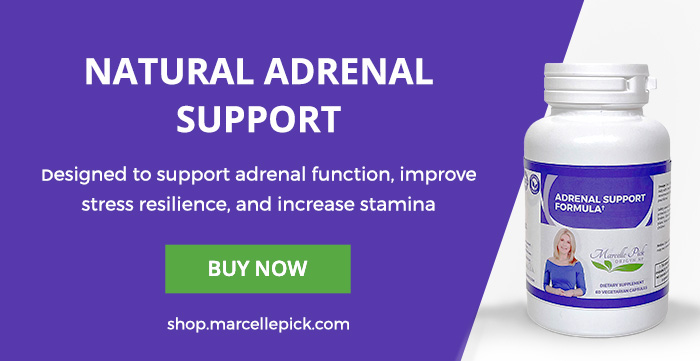One of the things I love most about my job is having the opportunity to help my patients make sense of the confusing, contradictory things they hear in the media and from their doctors and friends about things like hormones, supplements, and health in general.
DHEA, a hormone that I’ve known to be incredibly powerful and helpful for so many women, is one of the most confusing and misunderstood topics out there. Over the years, the media has bounced around multiple times on this subject. One day, DHEA is a miracle supplement for longevity, weight loss, and disease prevention. Then, we hear that this has all been “hype”.
The problem is that when we make black and white, blanket statements about any hormone or nutrient, we are missing so many important nuances. With DHEA, we’re talking about a very complex hormone that plays a plethora of different roles and that everyone responds to differently, based on their individual biochemistry.
Is it a “cure” for aging? I think we are asking the wrong question. As with most things, the answer and the reality is somewhere in the middle. We do know that low levels of DHEA are associated with many negative effects of the aging process, and boosting levels of this hormone can have all kinds of benefits related to vitality, the slowing or prevention of chronic disease, weight, mood, energy levels, and youthful skin.
Before we get too deep into the anti-aging benefits of DHEA, let’s talk a little bit about the concept of aging. The term “anti-aging” is not one of my favorites, as it implies that there is something inherently wrong with getting older.
I often think of the saying “you’re only as old as you feel”. That’s where I see DHEA playing a role when it comes to aging. We are all going to get older, and this isn’t something that we should try to prevent or change. Our 40s, 50s, 60s, and beyond can be the most incredible times of our lives! But we want to get older gracefully, with our vitality and health intact. We want to get older without having to worry about the chronic illnesses we associate with age; we want to get older with sharp minds and memories, and with bodies and skin that we’re comfortable in. These are some of the areas where I’ve seen DHEA be helpful.
The Relationship Between DHEA and Aging
I’ve talked about DHEA a lot, because it is such a fascinating hormone that wears so many hats, especially for women. As a basic overview, DHEA is a hormone that is produced primarily by the adrenal glands. DHEA is our body’s most abundant precursor hormone– sometimes referred to as a “parent” hormone– which means that it converts into other hormones, including estrogen and testosterone. Because of this, DHEA is important for supporting overall hormonal balance.
Our levels of DHEA naturally decline as we get older, beginning in our 20s and 30s. By the time we reach menopause, our DHEA levels are generally about 60% of what they once were.
It is normal for DHEA levels to decline gradually as we age, but in some cases, such as with the onset of chronic disease or in cases of adrenal fatigue, levels drop more dramatically.
Because of the clear association between falling DHEA levels and aging, it stands to reason that boosting DHEA levels may be helpful in the prevention of some negative effects of the aging process.
A number of age-related chronic illnesses are associated with decreased levels of DHEA, and DHEA supplementation has been found to improve many factors associated with the development of these illnesses, along with other signs and symptoms of aging.
Anti-Aging Benefits of Boosting DHEA
When it comes to the effects of aging, there are all kinds of potential benefits of boosting DHEA. Keep in mind, again, that I am using “anti-aging” as a general term. While living for as long as possible might be part of the goal for some people, I am more interested in the “life in your years” than the “years in your life”, as the saying goes.
The benefits of DHEA when it comes to aging relate to the prevention of chronic illness, the improvement of cognitive function, bone health, and mood, and the maintenance of a healthy weight, body composition, and skin.
Research has found many associations between low levels of DHEA and multiple chronic diseases.
DHEA helps to reduce chronic inflammation, which is part of why it has so many benefits for chronic disease prevention, as inflammation is the common thread underlying chronic illnesses of all kinds.
One important benefit of DHEA is its effects on immune function. Our immune function is something else that generally declines with age, but DHEA may help to mitigate some of these effects. It has been shown to boost immune function, help to enhance resistance to viruses and some parasites, and assist with wound healing.
DHEA has been shown to boost the production of healthy and powerful collagen protein, which is a big part of what makes it so popular for skin health. Topical DHEA can help to improve skin brightness, smoothness, and irritation.
DHEA and Metabolic Syndrome
DHEA has a positive effect on many of the different factors involved in the development of metabolic syndrome, including body composition and blood sugar regulation.
Obesity, diabetes, and heart disease are becoming increasingly common, especially as we get older. DHEA may help to protect against all three, in part by boosting metabolism, changing the composition of adipose tissue and body composition, and decreasing abdominal and overall fat. DHEA may also improve insulin sensitivity, which assists in the prevention of metabolic syndrome and type 2 diabetes.
Low levels of DHEA have been linked to increased risk of heart disease, diabetes, and earlier death. It is a good idea to check your levels regularly as you get older, paying especially close attention to any rapid declines, which can be helpful and important warning signs.
There are also a number of benefits of DHEA for bone strength and structure (particularly for women), joint function, and the prevention of osteoarthritis.
DHEA, Cognitive Function, and Mood
Some of the most exciting DHEA benefits that I’ve seen, both in studies and with my own patients, relate to cognitive function. It is a common misconception that a deteriorating memory and foggier mind are inevitable effects of aging. DHEA can help to improve memory, cognitive function, decision making, and concentration, keeping us sharp and clear-minded well into our later years.
DHEA has been found to have several neuroprotective benefits, meaning that it may help to prevent the development of neurodegenerative diseases such as Alzheimer’s.
There has been some very compelling research on DHEA’s positive effects on mood. DHEA may help to alleviate depression and depressive symptoms, particularly in patients aged 45-65. It has also been shown to improve mood in those who do not suffer from depression.
It can help to enhance overall wellbeing and quality of life, and can help with many of the effects of perimenopause. DHEA has also been shown to enhance sex drive.
DHEA and Adrenal Fatigue
DHEA is produced primarily by the adrenal glands, so those who are suffering from adrenal fatigue or dysfunction are likely to struggle even more with lower DHEA levels. This is something I see all the time in my practice, and boosting DHEA in these cases can be such a life changer for these women! I often see increased energy, enhanced mood, and healthy weight loss.
Who Should Take DHEA Supplements?
There have been some inconsistencies in research on DHEA, which stands to reason, as we are all unique, and DHEA is such a complex hormone that interacts with everyone’s biochemistry a little differently. I definitely don’t support the idea that everyone should go out and buy DHEA from the pharmacy after reading about the benefits. Boosting DHEA levels can be incredibly effective and beneficial, but it should only be done under the supervision of a qualified practitioner.
It is also very important to be cautious about the quality of your DHEA supplements, as many store brands are not really what they claim to be, or come in doses that are way too high for most people. This is another reason why it’s so important to consult with a practitioner before experimenting with this hormone.
Inconsistent supplement quality is not something that we should blame on DHEA itself, but it is certainly a reason to be cautious. There are also some possible side effects of DHEA, which some women may be more at risk of experiencing.
All of that said, if you are dealing with any of the symptoms or concerns we tend to associate with aging, perimenopause, or hormonal imbalances, it is worth looking into DHEA with your practitioner, to see if it is the right fit for you.
One of the great things about supplementing with DHEA, especially when compared to other forms of hormone therapy or replacement, is that DHEA has the ability to convert into other hormones where they are needed.
Replenishing this hormone just might help to restore your vitality and make you feel your best!
Boosting DHEA Naturally
When we think of DHEA for anti-aging, we tend to think of taking supplements. Sometimes, I do start there with my patients, especially when they are exhausted from adrenal fatigue and burnout, and they really need a kickstart in order to get themselves going. But I am a huge supporter of boosting DHEA production naturally, with lifestyle changes.
Even when I do start patients on DHEA supplements, it is not intended to be a long term or “band-aid” solution. It is a helpful starting point, while we work on crucial areas of change for natural, healthy DHEA production.
We can boost DHEA production naturally by supporting our adrenal function. This means finding ways to cut down on stress, getting enough good quality sleep, exercising gently, and eating healthy, fresh, whole foods and increasing the joy in your life.
All of these lifestyle factors– as well as maintaining a positive, accepting attitude about getting older– are really what matters when it comes to preserving our health and vitality as we age. We have to remember to take care of ourselves, even as we are taking care of others. We have to remember to listen to our bodies, and give ourselves the rest and relaxation that we need and deserve. Our bodies are incredibly resilient, and I have seen time and time again that it is possible to restore adrenal function, balance hormones, boost DHEA levels, and feel great at any age.








